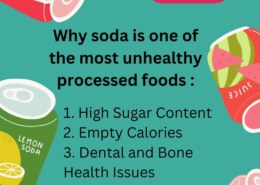One of the most unhealthy processed foods is soda, or sugary soft drinks. These beverages are loaded with added sugars and offer no nutritional benefits. A single can of soda can contain up to 40 grams of sugar, which far exceeds the recommended daily sugar intake. Consuming excessive amounts of sugRead more
One of the most unhealthy processed foods is soda, or sugary soft drinks. These beverages are loaded with added sugars and offer no nutritional benefits. A single can of soda can contain up to 40 grams of sugar, which far exceeds the recommended daily sugar intake. Consuming excessive amounts of sugar can lead to numerous health issues, including obesity, type 2 diabetes, heart disease, and dental problems.
Soda is particularly harmful because it provides “empty calories”—calories that contribute to weight gain without offering essential nutrients like vitamins, minerals, or fiber. The high fructose corn syrup commonly used in sodas is metabolized by the liver and can lead to fat accumulation and liver disease.
Moreover, the acidity in soda can erode tooth enamel, leading to cavities and dental decay. Regular consumption of soda is also linked to poor bone health, as it can interfere with calcium absorption.
In addition to sugar, many sodas contain artificial additives and preservatives, which have been associated with adverse health effects. For example, some caramel colorings used in dark sodas can produce potentially carcinogenic by-products.
Overall, the combination of high sugar content, lack of nutrients, and potential harmful additives makes soda one of the most unhealthy processed foods available.
See less

Preventing dementia involves a combination of lifestyle choices, health management, and mental activities. Here are some strategies that may help reduce the risk: Stay Physically Active: Regular exercise improves blood flow to the brain and can help reduce the risk of cognitive decline. Maintain a HRead more
Preventing dementia involves a combination of lifestyle choices, health management, and mental activities. Here are some strategies that may help reduce the risk:
While no method guarantees prevention, these strategies can help promote overall brain health and potentially reduce the risk of dementia.
See less